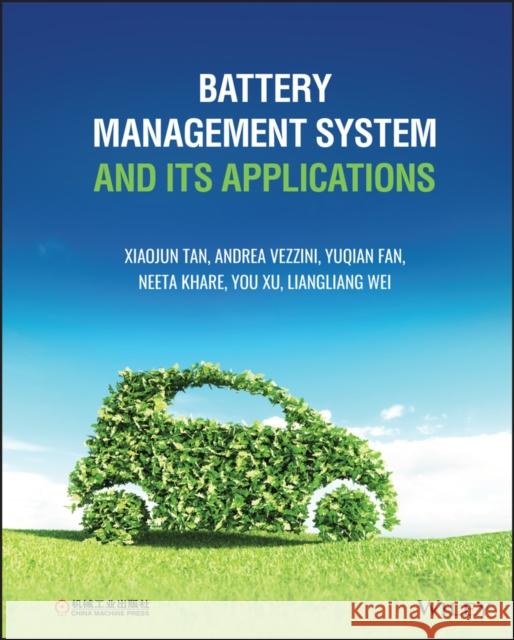Battery Management System and Its Applications » książka



Battery Management System and Its Applications
ISBN-13: 9781119154006 / Angielski / Twarda / 2022 / 320 str.
Battery Management System and Its Applications
ISBN-13: 9781119154006 / Angielski / Twarda / 2022 / 320 str.
(netto: 488,00 VAT: 5%)
Najniższa cena z 30 dni: 509,25
ok. 30 dni roboczych.
Darmowa dostawa!
Preface xiiiAbout the Authors xvPart I Introduction 11 Why Does a Battery Need a BMS? 31.1 General Introduction to a BMS 31.2 Example of a BMS in a Real System 51.3 System Failures Due to the Absence of a BMS 72 General Requirements (Functions and Features) 112.1 Basic Functions of a BMS 112.2 Topological Structure of a BMS 163 General Procedure of the BMS Design 193.1 Universal Battery Management System and Customized Battery Management System 193.2 General Development Flow of the Power Battery Management System 21Part II Li-Ion Batteries 274 Introduction to Li-Ion Batteries 294.1 Components of Li-Ion Batteries: Electrodes, Electrolytes, Separators, and Cell Packing 294.2 Li-Ion Electrode Manufacturing 314.3 Cell Assembly in an Li-Ion Battery 324.4 Safety and Cost Prediction 335 Schemes of Battery Testing 375.1 Battery Tests for BMS Development 375.2 Capacity and the Charge and Discharge Rate Test 415.3 Discharge Rate Characteristic Test 445.4 Charge and Discharge Equilibrium Potential Curves and Equivalent Internal Resistance Tests 465.5 Battery Cycle Test 495.6 Phased Evaluation of the Cycle Process 586 Test Results and Analysis 676.1 Characteristic Test Results and Their Analysis 676.2 Degradation Test and Analysis 807 Battery Modeling 1017.1 Battery Modeling for BMS 1017.2 Common Battery Models and Their Deficiencies 1027.3 External Characteristics of the Li-Ion Power Battery and Their Analysis 1057.4 A Power Battery Model Based on a Three-Order RC Network 1107.5 Model Parameterization and Its Online Identification 1177.6 Battery Cell Simulation Model 124Part III Functions of BMS 1338 Battery Monitoring 1358.1 Discussion on Real Time and Synchronization 1358.2 Battery Voltage Monitoring 1398.3 Battery Current Monitoring 1458.4 Temperature Monitoring 1499 SoC Estimation of a Battery 1539.1 Different Understandings of the SoC Definition 1539.2 Classical Estimation Methods 1589.3 Difficulty in an SoC Estimation 1629.4 Actual Problems to Be Considered During an SoC Estimation 1669.5 Estimation Method Based on the Battery Model and the Extended Kalman Filter 1699.6 Error Spectrum of the SoC Estimation Based on the EKF 17710 Charge Control 19310.1 Introduction 19310.2 Charging Power Categories 19610.3 Charge Control Methods 19810.4 Effect of Charge Control on Battery Performance 20310.5 Charging Circuits 20410.6 Infrastructure Development and Challenges 20910.7 Isolation and Safety Requirement for EC Chargers 21111 Balancing/Balancing Control 21311.1 Balancing Control Management and Its Significance 21311.2 Classification of Balancing Control Management 21811.3 Review and Analysis of Active Balancing Technologies 22111.4 Balancing Strategy Study 22611.5 Two Active Balancing Control Strategies 23411.6 Evaluation and Comparison of Balancing Control Strategies 24512 State of Health (SoH) Estimation of a Battery 25712.1 Definition and Indices/Parameters of SoH 25712.2 Modeling of Battery Degradation (Aging) and SoH Estimation 26512.3 Battery Degradation Diagnosis for EVs 27813 Communication Interface for BMS 29113.1 BMS Communication Bus and Protocols 29313.2 Higher-Layer Communication Protocols 29813.3 A Case Study: Universal CiA EnergyBus for a Low-Emission Vehicle (LEV) 29914 Battery Lifecycle Information Management 30114.1 Data Type of Power Battery 30114.2 Vehicle Instrument Data Display 30214.3 Battery Data Transmission Mode 30614.4 Information Concerning a Full-Power Battery Lifecycle 31114.5 Storage and Analysis of Historical Information of a Battery 31614.6 Battery Detection System Based on a Mobile Terminal 320Part IV Case Studies 32715 BMS for an E-Bike 32915.1 Balancing 32915.2 Battery Pack Design for an E-Bike 33115.3 Methodology 33315.4 Active Balancing Solutions 33715.5 Test Results 34115.6 Possibility with Active Balancing 34915.7 Results and Evaluation 34916 BMS for a Fork-Lift 35316.1 Lithium-Iron-Phosphate Batteries for Fork-Lifts 35316.2 Battery Management Systems for Fork-Lifts 35516.3 The LIONIC Battery System for Truck Applications 35616.4 Application 35716.5 The Usable Energy Li-Ion Traction Batteries 35917 BMS for a Minibus 36317.1 Internal Resistance Analysis of a Power Battery System and Discharging Strategy Research of Vehicles 36117.2 Consistency Evaluation Research of a Power Battery System 37717.3 Safety Management and Protection of a Power Battery System 386Index 389
Xiaojun Tan, Sun Yat-sen University, China, is a Professor and leads the Research Center of New Energy Vehicles at the School of Intelligent Systems Engineering, Sun Yat-sen University. He has nearly two decades' research experience in battery modeling, testing and diagnoses, and has spearheaded many industry partnerships.Andrea Vezzini, Bern University of Applied Sciences, Switzerland is a Professor with more than two decades' experience in battery systems research and development. He leads the Energy Storage Research Centre (ESReC) at Bern University of Applied Sciences and has been involved through several spin-offs in the product development of customized battery system solutions for the industrial and automotive market.Yuqian Fan, received his PhD. in Intelligent Transportation Engineering from Sun Yat-sen University, China. His research interests include intelligent control and optimization design for power battery systems, battery thermal management and thermal safety, and battery state of health prediction.Neeta Khare, is a Director with Iveco Group. Dr. Khare acquired her doctoral degree in Intelligent Battery Monitoring from Banasthali University, India. Her core expertise is in aging algorithms of battery/ cell using AI and adaptive algorithms, Battery Pack, Battery Management System (BMS) development, and more.You Xu, is an Associate Professor at Guangdong Polytechnic Normal University, China, where he has been engaged in power battery system, precision reverse equipment. Dr. You received his PhD. from Sun Yat-sen University. He has authored over 20 scientific publications, and his research interests include battery management for electrical vehicles.Liangliang Wei, is an Associate Professor in Control Science and Engineering at Sun Yat-Sen University, China. Dr. Wei has authored over 20 scientific publications and received his PhD. in Electrical Engineering from the Wuhan University, China.
1997-2026 DolnySlask.com Agencja Internetowa
KrainaKsiazek.PL - Księgarnia Internetowa









